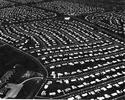Alan Mallach is out with a new study from the Lincoln Institute of Land Policy called “The Empty House Next Door.” It’s a look at vacant housing in America’a cities. This chart should give you a feel for the problem in a number of places. read more »
Demographics
What is Middle-Income Housing Affordability?
Few local or metropolitan issues receive more attention than housing affordability. This article provides a perspective on housing affordability. The focus is on the approach used by the Demographia International Housing Affordability Survey, which I co-author annually with Hugh Pavletich (of performanceurbanplanning.org). The Demographia Survey has been published for 14 years. read more »
- Login to post comments
Superstar Effect, Harvard Graduate Edition
The Harvard Crimson just published a piece on where the Harvard class of 2018 is going after graduation.
22% of them are going to New York (state I believe), 20% to Massachusetts, and 15% to California. The next biggest destination is Washington, DC at 4.9% (District of Columbia only?) read more »
- Login to post comments
Patriarchy Or No, It’s Good To Have Dad Around On Father’s Day
This Father’s Day takes place amid growing assault on what is widely called “patriarchy.” In the era of #MeToo-inspired militant feminism, it’s become increasingly fashionable to reject maleness and castigate fatherhood, as largely irrelevant and even damaging. read more »
- Login to post comments
Hooked on a Feeling: Unique Experiences Help Fill Wisconsin’s Talent Pipeline
By all measures economists use to assess the quality of life a place offers—job availability, cost of living, commute times, recreation, etc.—Wisconsin stacks up pretty well. Very well, in fact. Problem is, people don’t consult economists when choosing the best place to pursue their passions. As CEO of NEWaukee, I devote my professional life and much of my personal life to promoting Milwaukee and Wisconsin as a career and lifestyle destination. read more »
- Login to post comments
Housing Affordability from Vancouver to Sydney to Toronto: Time to Do What Works
The front page of The Wall Street Journal cited the difficulty of cities (Note 1) trying to stop the escalation of house prices “Western Cities Try, and Fail, To Slow Chinese Home Buying.” The more descriptive online headline said: Western Cities Want to Slow Flood of Chinese Home Buying. Nothing Works: Governments from Vancouver to Sydney to Toronto are using taxes and other restrictions to tackle real-estate bubbles. read more »
- Login to post comments
Vermont Subsidizes Remote Workers to Move to the State
Vermont, like many states, is suffering from demographic challenges. It has the fourth slowest population growth of any state since 2000. It has the lowest share of its population who are children under 18 (if you exclude the District of Columbia, a “city-state” from the figures). Vermont is also impeccably progressive, has many quaint cities and towns, and is known for natural beauty. None of these factors has driven population growth there. read more »
- Login to post comments
Blue-Collar Blues In The Southern California Job Market
Every year over the past decade, in the Forbes’ annual “Best Places for Jobs” survey, we have been fortunate to assess Southern California’s economy and compare it to other large metropolitan areas. The results point to some strong points but also many long-term problems that regional leaders need to address. read more »
- Login to post comments
The Middle East Could Use Less Warfare and More Capitalism
Jet fighters, smart bombs, terrorism and ethnic cleansing have not exactly improved the Middle East. Yet the perennial world trouble spot is not without resources — an increasingly educated population, massive energy resources and ample capital — but still suffers economically, with the world’s worst unemployment rates. read more »
- Login to post comments
Suburb & Exurbs Dominate House Building Over Six Decades
In recent years we have been using the City Sector Model (Figure 6, see City Sector Model Note below) to analyze the extent of urban core, suburban and exurban trends in major metropolitan areas. The City Sector Model gives a more accurate picture of how much modern metropolitan areas are dominated by the automobile oriented suburbanization that has occurred since World War II. read more »
- Login to post comments





















